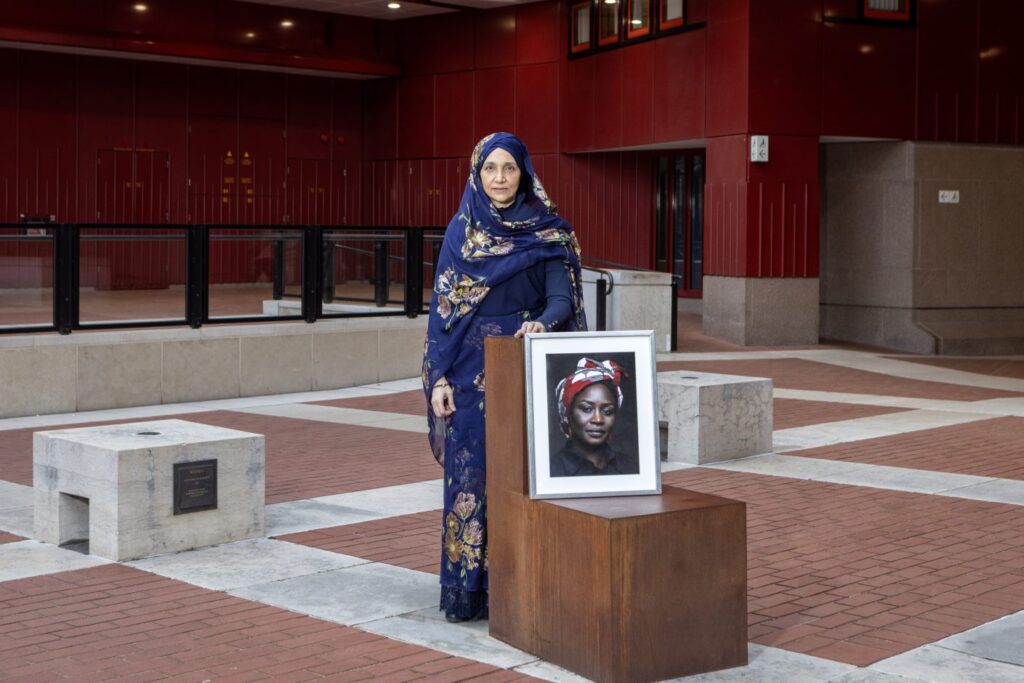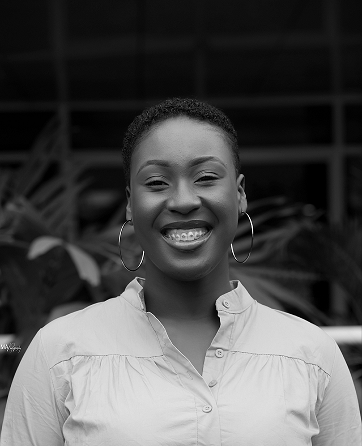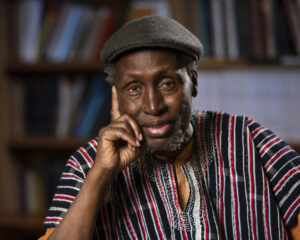The Sudanese novelist Leila Aboulela has been awarded the 2025 PEN Pinter Prize. She was lauded for her “nuanced and rich perspectives on . . . faith, migration, and displacement,” in fiction “extraordinary in its range and sensibility.” Her work includes six novels — The Translator (1999), Minaret (2005), Lyrics Alley (2010), The Kindness of Enemies (2015), Bird Summons (2019), and River Spirit (2023) — and two short story collections, Coloured Lights (2001) and Elsewhere, Home (2018). She is the second Open Country Mag cover star to receive the prestigious honour after appearing on our cover, following 2021 winner Tsitsi Dangarembga, and the third overall, after 2018 winner Chimamanda Ngozi Adichie.
Organized by English PEN, the annual PEN Pinter Prize is given to a writer residing in the United Kingdom, the Republic of Ireland, the Commonwealth or former Commonwealth, who, in the words of the late playwright and Nobel laureate Harold Pinter, casts an “unflinching, unswerving” gaze upon the world and shows a “fierce intellectual determination . . . to define the real truth of our lives and our societies.”
The award ceremony proper took place on October 10 at the British Library in London, where Aboulela delivered an address and declared her choice for co-winner: the recipient of the PEN International Writer of Courage, awarded to a writer “who is active in defence of freedom of expression, often at great risk to their own safety and liberty.” She chose fellow Sudanese writer Stella Gaitano.
“It is an honour and a pleasure to share my prize with Stella Gaitano, a writer I have admired and read avidly over the years,” Aboulela said. “Stella is a principled writer and a fearless activist, who has endured hate speech and physical threats. Reading her work has opened my eyes to the injustices and consequences of war in Sudan. She is a wonderful, enriching writer who has already broken new ground in African literature.”
The Writer of Courage award is usually co-selected by English PEN’s Writers at Risk Committee.
“I am honoured that Leila Aboulela has chosen to share this award with me,” Gaitano said. “It might seem like happy news, but when I think about how I might not have been here to witness it, it brings tears to my eyes. This is not only an award for courage, but also one for survival. I dedicate it to the brave Sudanese and South Sudanese writers who continue to write during wartime, in the absence of freedom of expression. I dedicate it to all the persecuted writers of the world whose words have led them to prison, exile, or death. Telling the truth can risk such threats. But it can also shake the authority that refuses to accept it, grant light and freedom, and promise a better tomorrow. An act with such power is worth the risk.’
Stella Gaitano was born in Khartoum in 1979, to a South Sudanese family. She studied English and Arabic at Khartoum University and trained as a pharmacist. When Sudan was partitioned in 2011, she moved to Juba, the capital of South Sudan. She returned to Khartoum after facing harassment and attacks for her outspoken criticism of the South Sudanese government. In 2022, she was awarded a fellowship from the PEN International Writers-in-Exile programme and relocated to Germany.
Gaitano writes in Arabic and has published two short story collections and the novels Edo’s Souls and Ireme. Translated from the Arabic by Sawad Hussain and published by Dedalus Books, Edo’s Souls was awarded a PEN Translates grant in 2020 — becoming the first novel from South Sudan ever to be published in the UK.

At the first announcement on July 9, during English PEN’s annual summer party at the October Gallery in London, actors Khalid Abdalla and Amira Ghazalla read excerpts from Aboulela’s work at the event. At the time, Aboulela had said: “This comes as a complete and utter surprise. Thank you, English PEN and the judges, for considering my work worthy of this award. I am honoured to win a prize established in memory of Harold Pinter, a great writer who continues to inspire so much loyalty and consistent high regard. For someone like me, a Muslim Sudanese immigrant who writes from a religious perspective probing the limits of secular tolerance, this recognition feels truly significant. It brings expansion and depth to the meaning of freedom of expression and whose stories get heard.”
Aboulela was Fiction Winner of the Scottish Book Awards in 2011 and of the Saltire Fiction Book of the Year Award in 2018. Aboulela was also the first ever recipient of the Caine Prize for African Writing in 2000. In 2023, following the breakout of civil war in Sudan, she appeared on the cover of Open Country Mag, for a longform profile by me contextualizing her most recent novel River Spirit and illustrious career.
This year’s judging panel comprised Chair of English PEN Ruth Borthwick, British author and poet Mona Arshi, and British Somali novelist Nadifa Mohamed.
“In novels, short stories and radio plays she has navigated the global and local, the political with the spiritual, and the nostalgia for a past home with the concurrent curiosity and desire for survival in a new one,” Mohamed said. “Aboulela’s work is marked by a commitment to make the lives and decisions of Muslim women central to her fiction, and to examine their struggles and pleasures with dignity. In a world seemingly on fire, and with immense suffering unmarked and little mourned in Sudan, Gaza, and beyond, her writing is a balm, a shelter, and an inspiration.”
Borthwick stated, “She is not the first to write about the experience of migration, but Leila is a writer for this moment, and my hope is that with this prize her gorgeous books find new readers, and open our minds to other possibilities.”
Mona Arshi added, “Over the past few decades she has made a significant contribution to literature and writes with subtlety and courage in the way she storifies the interior lives of women who are often ignored or silenced in our culture.”
Last year, Indian author Arundhati Roy won the PEN Pinter Prize and announced the British Egyptian activist Alaa Abd el-Fattah as Writer of Courage. Other previous winners include Linton Kwesi Johnson (2020), Salman Rushdie (2014), and Hanif Kureishi (2010).





